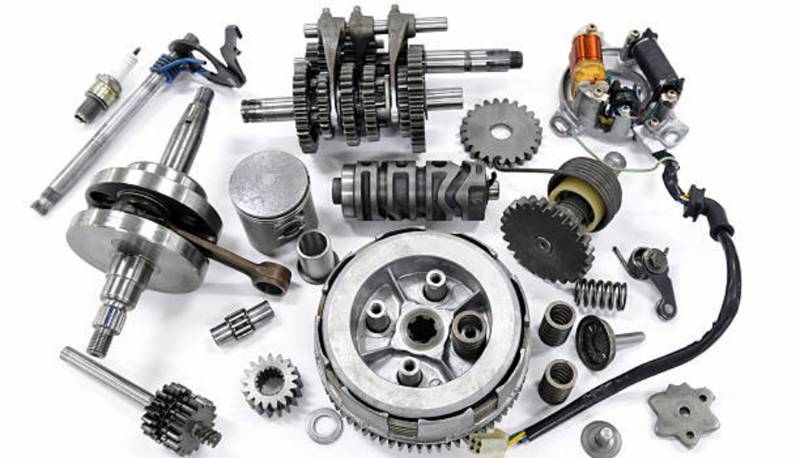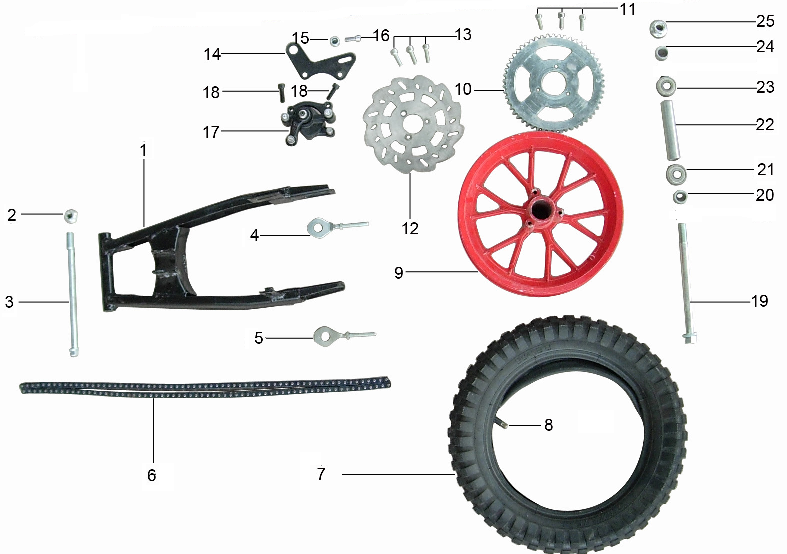Discover the Necessary MotorBike Parts You Need for Optimal Performance
Comprehending the vital parts of a motorcycle is fundamental for achieving peak performance. Each element, from the engine to the braking system, plays a crucial duty in total functionality and safety. Normal upkeep can stop unanticipated failings and enhance the riding experience. Nevertheless, several motorcyclists forget the ins and outs of these systems. Discovering how they interact can lead to a much more effective trip. What important elements should every cyclist prioritize?
The Engine: The Heart of Your Motorbike
The engine works as the core component of a motorbike, driving its efficiency and specifying its abilities. It is liable for converting fuel right into mechanical power, which powers the bike forward. Different kinds of engines are used, including single-cylinder, V-twin, and inline configurations, each offering unique characteristics matched for different riding designs and purposes. The engine size, typically determined in cubic centimeters (cc), considerably affects efficiency, with bigger engines usually giving even more power and torque.Furthermore, the engine's style and technology, such as fuel injection systems or air-cooling versus liquid-cooling, impact effectiveness and integrity. Upkeep is essential for peak operation; elements like normal oil changes and monitoring spark connects warranty durability. Riders typically think about an engine's responsiveness and level of smoothness, as these features enhance the general riding experience. Ultimately, the engine remains a crucial element that specifies not only the bike's efficiency yet likewise the biker's link to the maker.
The Transmission: Moving Gears Smoothly
The transmission plays a necessary role in a motorbike's efficiency, specifically in the technicians of gear changing. Recognizing just how to shift equipments smoothly can improve the overall riding experience, while normal maintenance guarantees peak functionality. Appropriate focus to these facets can greatly influence the longevity and performance of the bike.

Gear Shifting Mechanics
Smooth equipment moving is essential for optimal motorbike performance, substantially influencing both velocity and control. The technicians of equipment moving involve the interaction in between the clutch, equipment bar, and transmission system. When a cyclist engages the clutch, it disengages the engine from the transmission, permitting a gear modification without harming the parts. A well-timed launch of the clutch, incorporated with specific activity of the equipment lever, promotes a smooth adjustment in between equipments. This process ensures that the engine operates within its ideal power band, boosting performance. Oem Parts New Zealand. In addition, recognizing the gear proportions and their result on speed and torque can aid bikers make notified selections during changes, eventually adding to a much more responsive and delightful riding experience
Maintenance Tips Value
Regular upkeep plays a crucial duty in assuring that the transmission system operates efficiently, permitting smooth equipment shifts. On a regular basis checking and transforming the transmission fluid is vital, as old fluid can lead to increased rubbing and wear. Additionally, inspecting the clutch for wear assurances peak involvement and disengagement, stopping slippage during equipment changes. Lubrication of moving parts is similarly vital to decrease rubbing and boost efficiency. Bike owners should also keep an eye on for leakages and unusual noises, as these can suggest underlying problems. By adhering to these upkeep ideas, motorcyclists can prolong the life expectancy of their transmission system, assuring that equipment changes remain smooth and adding to the total efficiency of their motorbike.
The Braking System: Ensuring Safety on Every Ride
Braking systems are fundamental parts that directly influence a motorcycle's safety and efficiency. They contain numerous components, including brake pads, rotors, calipers, and hydraulic lines, all collaborating to guarantee reliable slowdown. The type of stopping system-- normally either disc or drum-- influences responsiveness and stopping power.Regular maintenance is vital to copyright peak performance; used brake pads can cause lowered performance and boosted quiting distances. Additionally, the quality of brake fluid need to be kept an eye on, as it can soak up wetness in time, jeopardizing braking efficiency.Riders ought to additionally think about the value of anti-lock braking systems (ABS), which protect against wheel lockup throughout abrupt stops, boosting overall safety and security. Effectively operating brakes are not just concerning quiting; they infuse confidence in the biker, permitting much safer navigating through various terrains. Eventually, a trustworthy stopping system is crucial for appreciating every experience with satisfaction.
The Suspension: Enhancing Convenience and Control
A well-functioning shock absorber significantly adds to a motorbike's overall efficiency, matching the efficiency of the stopping system. The suspension plays a significant duty in absorbing shocks from irregular surface areas, assuring a smoother experience while keeping tire call with the roadway. This get in touch with is essential for both stability and control, allowing bikers to navigate corners with self-confidence and precision.Different kinds of suspension systems, such as telescopic forks or mono-shocks, provide differing levels of convenience and handling. Effectively tuned suspension improves responsiveness, giving the cyclist with a more connected feeling to the motorcycle. Normal maintenance checks are necessary to ascertain the suspension elements, consisting of dampers and springs, are operating at their ideal. An effective suspension system not only boosts the riding experience yet additionally adds to the durability of various other motorcycle components by minimizing deterioration. Consequently, purchasing top quality suspension is important for any type of severe motorbike lover.
The Tires: Connecting You to the Roadway
Tires play a vital role in a motorcycle's efficiency, acting as the primary web link in between the biker and the roadway. Comprehending the different types of tires available can considerably affect handling and security. In addition, routine upkeep is vital to assure peak tire performance and durability.
Tire Keys In Explained
How do various tire types affect a motorcycle's performance? Tire kinds play an important duty in determining a motorcycle's grasp, security, and handling. Sport tires, developed for high efficiency, offer enhanced traction and responsiveness on smooth roadways, making them excellent for competing and hostile riding. Conversely, visiting tires focus on sturdiness and comfort, providing a smoother experience for long-distance travel. Off-road tires, defined by their tough walk patterns, master traction on unpaved surfaces, suitable for journey enthusiasts. Additionally, dual-sport tires mix characteristics from both off-road and on-road categories, accommodating flexible riding needs. Ultimately, selecting the best tire kind is important for enhancing performance, making certain safety, and enhancing the total riding experience.
Maintenance Tips Offered
While riding when driving, keeping ideal tire condition is important for safety and security and efficiency. Consistently inspecting tire pressure is essential, as under-inflated tires can result in inadequate handling and increased wear. It is advisable to examine step depth regularly; used tires concession grip and security. Furthermore, riders need to seek indicators of damages, such as bulges or fractures, which can indicate the requirement for replacement. Rotating tires regularly guarantees even put on, improving longevity. Keeping tires tidy from debris and avoiding excessive curbs can lengthen their life-span. Maintaining appropriate placement and balance adds to come to a head performance, lessening stress on other bike elements. Adhering to these upkeep pointers will greatly enhance the general riding experience.
The Gas System: Sustaining Efficiency and Efficiency
The fuel system pop over here plays a vital role in making best use of a motorcycle's performance and performance, as it ensures the optimal distribution of fuel to the engine. It makes up numerous important elements, consisting of the fuel storage tank, fuel pump, gas filter, and gas injectors or carburetor. Each part must function properly to ensure a smooth and effective ride.The fuel tank stores gasoline and provides it to the engine through the fuel pump, which generates the needed pressure. A gas filter avoids contaminants from going into the engine, while the injectors or carburetor mix fuel with air for combustion.Proper maintenance of the gas system is vital; a blocked filter or malfunctioning injector can cause decreased efficiency and increased fuel intake. By verifying that the gas system runs effectively, riders can enjoy enhanced throttle reaction, better gas economy, and on the whole improved riding experience.
The Electrical System: Powering Your Trip
An effective electrical system is essential for the overall functionality and safety and security of a motorcycle, as it powers crucial parts such as the ignition, lighting, and various electronic systems. This system consists of the battery, which stores power, and the alternator, in charge of creating power while the engine runs. The electrical wiring harness links these elements, making sure reliable power distribution.Additionally, merges secure the system from overloads, while relays help regulate high-current devices with low-power signals. A well-maintained electric system enhances performance by guaranteeing smooth begins and regular procedure of signals and lights, important for rider exposure and safety.Regular checks of the battery's charge and connections are very important for protecting against electric failings. Bikers need to additionally evaluate circuitry for deterioration, ensuring all parts operate preferably. Eventually, a durable electric system adds significantly to the total performance and dependability of the motorcycle.
Frequently Asked Inquiries
How Commonly Should I Replace My Motorbike's Battery?
The frequency of bike battery replacement depends on usage and maintenance (Bike Parts Wellington). Typically, batteries must be replaced every 3 to five years. Routine checks can assist recognize explanation when a replacement is required for peak performance
What Devices Do I Required for Basic Motorcycle Upkeep?
For basic bike maintenance, one calls for important devices such as an outlet collection, wrenches, screwdrivers, pliers, tire pressure gauge, and a torque wrench. These tools assist in effective maintenance and guarantee the motorbike runs successfully and safely.
How Can I Boost My Motorbike's Aerodynamics?
To improve bike the rules of aerodynamics, one must think about readjusting fairings, utilizing windscreen expansions, maximizing body setting, and decreasing general weight. These adjustments assist reduce drag, boosting stability and fuel performance throughout adventures.
What Are the Indications of a Failing Electrical System?
Signs of a falling short electric system include lowering lights, trouble beginning, uneven instrument readings, and blown fuses. Motorcycle Parts Auckland. Unusual smells or corrosion around battery terminals might additionally indicate underlying issues needing prompt attention for security and efficiency

Just how Do I Select the Right Oil for My Motorbike?
When selecting oil for a motorbike, one should take into consideration the maker's requirements, viscosity ratings, and the kind of riding. In addition, artificial versus conventional oil can impact performance and engine defense, affecting the decision substantially. The engine dimension, usually measured in cubic centimeters (cc), considerably influences efficiency, with bigger engines typically providing even more power and torque.Furthermore, the engine's style and innovation, such as fuel shot systems or air-cooling versus liquid-cooling, influence efficiency and integrity. A well-functioning suspension system significantly contributes to a motorbike's general efficiency, enhancing the effectiveness of the stopping system. The fuel system plays a crucial duty in optimizing a motorcycle's efficiency and performance, as it guarantees the optimum distribution of fuel to the engine. A gas filter stops contaminants from getting in the engine, while the injectors or carburetor mix gas with air for combustion.Proper upkeep of the fuel system is vital; a clogged up Motorcycle Parts Auckland filter or malfunctioning injector can lead to decreased performance and enhanced fuel usage. A well-maintained electrical system boosts performance by ensuring smooth beginnings and consistent procedure of signals and lights, essential for rider visibility and safety.Regular checks of the battery's charge and connections are vital for stopping electrical failures.